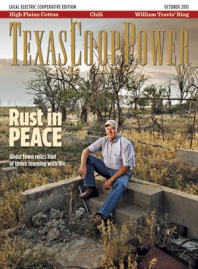Life-Changing Experience
I was on the Youth Tour in 1981 [“It’s the Trip of a Lifetime,” August 2013]. It was truly a life-changing experience. I was enthralled with Washington, the monuments, the memorials, the history. I came home, applied for an internship with my congressman (U.S. Rep. Charles W. Stenholm) but didn’t get chosen. But one of my letters of reference was my state representative, Larry Don Shaw. He told me if I didn’t get chosen I could come to Austin and intern for him. I did.
Went on to Texas A&M and became president of the student lobby group, and nearly 30 years later have my own election consulting company in Austin with stints in the governor’s office and Texas Legislature, but it all began with Youth Tour.
John R. Hatch via Facebook
Twelve years ago, I won the essay contest to enable me to go on the trip to Washington, D.C. I now live in D.C. and just ran into the group today. So much fun. Was able to talk to a few of the kids and told them how I won 12 years ago. I was part of Lamar County Electric Co-op. Glad to know you guys are still making this trip happen.
Minda Corso via Facebook
Empowering Members
This phrase near the end of “Light—and So Much More” [August 2013] really caught my eye: “powering communities and empowering members to improve the quality of their lives.” One of the issues that many of us in rural areas today still grapple with is the lack of quality Internet access.
We have spent thousands of dollars trying to set up Internet connections through multiple companies and currently spend over $120 per month for service that is inferior to the service my daughter gets in Houston for $29 per month. Electric co-ops did a great job powering rural areas. Maybe they need to consider adding a new focus on affordable and dependable rural Internet services. I know we would sign up!
Virginia Titterington | Rusk County EC
Climate Change
While reading about Gen. R.G. Dyrenforth [“Rain, You Blasted Sky!,” August 2013], I realized his true legacy is being the father of the climate change movement. His successors use fluorescent lightbulbs instead of dynamite. Yet both mistakenly believe that man can control God’s weather. Some things never change.
Marianne Rogers | Deep East Texas EC
Meaningful Work
The Texas Conservation Corps and American YouthWorks should get so much more coverage than they do for all their meaningful work [“Improvement Projects,” July 2013]. Thanks for putting them on the July cover. I loved the article written about their efforts in West.
Emily Neiman | Junction
Bat Bombs
I was so happy to see E.R. Bills’ story [“To the Bat Cave,” July 2013]. I give lots of talks about bats, and Project X-Ray is one of my stories. Most folks don’t believe me when I tell this story, so I am delighted to see it featured in your publication.
Michaeleen Moffitt | Trinity Valley EC
Just the Facts
I was pleased to read in your July Currents that “Wikipedia … is not a reliable source for fact-checking.” As a professional librarian, I find Wikipedia to be an interesting place to start research, but it certainly should not be the final authoritative source for factual quotes.
There are those who say librarians aren’t needed because we have the Internet, but just because you found information on the Internet does not mean you have found the correct information. It is best to find multiple sources and check the validity of those who create the Internet site or print resource. That is where professional knowledge managers—aka librarians—are helpful.
Tracy E. Luscombe | Grayson-Collin EC
Teddy Roosevelt
May I add that the name Rough Riders was decided upon after considering (or not): Teddy’s Terrors, Wood’s Wild Westerners, Roosevelt’s Rangers and Cavalry Cowpunchers [“Roosevelt’s Rough Riders,” July 2013]. Col. Leonard Wood was actually in command, not Lt. Col. Teddy Roosevelt. It’s a shame to leave Wood out, giving Roosevelt all the credit.
Roosevelt had wanted a war for years—with anyone—as long as he had a command.
It should be noted that Gen. John J. Pershing also led the charge up San Juan Hill with black troops. The Rough Riders and Roosevelt were hardly alone.
Walter Clark | CoServ Electric
I am always looking for connections between me, born in Cuba, and Texas—and now I found another one: Roosevelt’s favorite horse’s name, Little Texas, which he rode on the charge at San Juan Hill. I like to say that I am Cuban by birth, American by choice and Texan by good luck.
Maria E. Stein | Fayette EC
Civil War
I enjoyed “Engaged in History” [June 2013]. My great-grandfather died of injuries in Virginia. I will keep this magazine in my collection of Civil War things.
I hope you can read this. I fell and broke my left hand and have to write with my right hand. I’m 85 now.
Katy Kimbrow | United Cooperative Services
I found the article especially enjoyable. But I feel the story fell short in stating that the camps had camp followers.
While it is a fact that the military field units had many family members who traveled in support of the troops, these individuals were not camp followers. The women who went to war with their husbands, fathers, brothers and sweethearts, bringing along children or having them later, fulfilled vital roles such as laundresses, cooks, tailors, nurses and letter writers for wounded or illiterate soldiers.
Sherry Whitaker | Weatherford
Gen. Custer
As a serious Western historian, I must correct a major faux pas about Gen. George A. Custer in “Engaged in History” [June 2013]. Custer did not disobey orders from Gen. Alfred Terry on the way to defeat at Little Bighorn.
While Custer had spent the previous 10 years—on and off—since the Civil War fighting the plains Indians, Terry served his country from behind a desk. Recognizing Custer’s superior knowledge, experience and courage, Terry’s written and verbal orders gave Custer complete discretion in his course of action upon finding the “hostiles.”
After the 7th Cavalry’s shocking annihilation, many lies were told to explain how “Stone Age” Indians whipped the mighty U.S. Army. Disobeyed orders? Capt. Frederick Benteen actually disobeyed Custer. Shouldn’t have divided the troops? Standard operating procedure. Wait for Terry? Scouts said hostiles had spotted Custer’s soldiers. Terry was two days behind. Custer’s only option? Attack. Other lies include: too many recruits, jamming carbines, etc.
The main reason the Lakotas and Cheyennes won was Sitting Bull. In the great leader’s sun dance vision, God gave the Indians a huge victory. The warriors knew they would win before the first shot was fired.
Greg Mauz, Director, Van Alstyne Public Library | Concho Valley EC
Zip Lines
A year ago, Suzanne Haberman wrote about Adrenaline Zip Line Tours [“Zip-A-Dee-Doo-Dah,” September 2012]. I kept the article hoping one day we would finally go. It was my husband’s and best friend’s birthdays one weekend, so I booked the trip, including the recommendation of staying at Horseshoe Inn B&B (loved the owners, Butch and Pam Gragard). The weather was incredible that day, 78 degrees in July.
Can’t say enough about the friendly staff at Adrenaline and looking forward to another stay at Horseshoe Inn. Thanks for the great article and a trip we probably never would have taken if it hadn’t been for your article. Woo Whoo!
Kim Bates-Wallace | Bartlett EC


